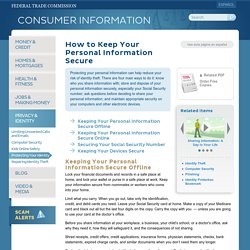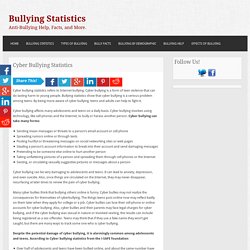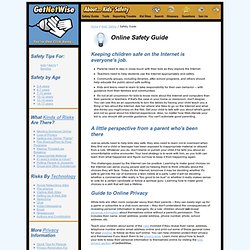

Internet safety. The Five Biggest Threats to Your Kids’ Privacy, and What You Can Do About Them. Remember back in school, when your teachers warned that everything you did would go on your permanent record?

It turns out your teachers have become right. That permanent record is the Internet. It’s hard to be a fully functioning adult in 2014 and not leave behind a digital trail. Now imagine how hard it is for your kids, who have never known a world where the net did not exist. From the moment they emerge from the womb, they’re generating data, which is then eagerly absorbed and stored by Internet companies, government agencies and some evil no-goodniks. Despite federal laws prohibiting the collection of data from children under the age of 13, dossiers are constantly being created about your kids, whether it’s Google capturing their search histories, advertisers creating profiles of their interests, or their grandparents tagging photos of them on Facebook.
Canadian Singles Find New Ways To Meet UrthBox Healthy Snack Boxes. Math Practice - Ages 5-15 Questions, complaints, kudos? How to Keep Your Personal Information Secure. Protecting your personal information can help reduce your risk of identity theft.

There are four main ways to do it: know who you share information with; store and dispose of your personal information securely, especially your Social Security number; ask questions before deciding to share your personal information; and maintain appropriate security on your computers and other electronic devices.
Keeping Your Personal Information Secure Offline Lock your financial documents and records in a safe place at home, and lock your wallet or purse in a safe place at work. Keep your information secure from roommates or workers who come into your home. Limit what you carry. Before you share information at your workplace, a business, your child's school, or a doctor's office, ask why they need it, how they will safeguard it, and the consequences of not sharing. Destroy the labels on prescription bottles before you throw them out.
Take outgoing mail to post office collection boxes or the post office. 10 Important Password Tips Everyone Should Know. Your bank data, your accounts, your email, and your life are all wrapped up in your ability to create secure passwords and remember them.

And yet most educators (and their students) struggle to remember passwords. With so many passwords stolen, there are things all of us SHOULD know to make our identities and bank accounts safer. Mark Burnett, author of the most commonly used passwords wordcloud featured on this post, says that the top 10,000 passwords represent 98.8% of all users. (This was said before services like Last Pass began being used.) So this means that if a hacker has those 10,000 passwords and takes a crack at your account, then 98.8% of us are at risk. Identity Theft & Fraud. 10 ways schools are teaching internet safety. "The student’s job is to figure out which website is the hoax.

After students have looked at all three websites and figured out which one is the hoax, they share what they found with their classmates," says one reader in describing a hands-on lesson. As internet use has become a daily part of most students’ lives, students must know how to protect themselves and their identity at all times—especially when teachers and parents aren’t there to help them.
Teaching students about internet safety has been important for as long as the internet has existed, but it’s in the spotlight this year in particular as schools get ready to apply for 2012 eRate discounts on their telecommunications services and internet access. That’s because applicants must amend their existing internet safety policies by July 1, 2012, to include information about how they are educating students about proper online behavior, cyber bullying, and social networking sites. 1.
The Carnegie Cyber Academy - An Online Safety site and Games for Kids. WebWise online course - Keeping safe online. Internet Savvy Training. KEEP CALM AND THINK BEFORE YOU POST! Poster. Cyber Bullying Statistics. Cyber bullying statistics refers to Internet bullying.

Cyber bullying is a form of teen violence that can do lasting harm to young people. Bullying statistics show that cyber bullying is a serious problem among teens. By being more aware of cyber bullying, teens and adults can help to fight it. Cyber bullying affects many adolescents and teens on a daily basis. Cyber bullying involves using technology, like cell phones and the Internet, to bully or harass another person.
Online Safety Guide. Home / Kids' Safety / Safety Guide Keeping children safe on the Internet is everyone's job.

Parents need to stay in close touch with their kids as they explore the Internet.Teachers need to help students use the Internet appropriately and safely.Community groups, including libraries, after-school programs, and others should help educate the public about safe surfing.Kids and teens need to learn to take responsibility for their own behavior -- with guidance from their families and communities.It's not at all uncommon for kids to know more about the Internet and computers than their parents or teachers. If that's the case in your home or classroom, don't despair. You can use this as an opportunity to turn the tables by having your child teach you a thing or two about the Internet. Ask her where she likes to go on the Internet and what she thinks you might enjoy on the Net. A little perspective from a parent who's been there The challenges posed by the Internet can be positive.
Safebook. Emma's Story - Cyberbullied by a Best Friend Video. Online.